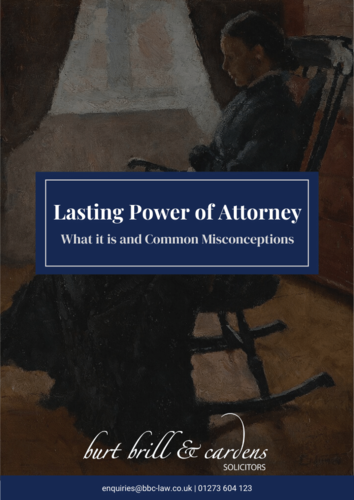If you make an LPA, you will be able to decide who you want to be your attorney and how much power they should have over your affairs if you lose capacity. More than one person can be chosen to act as your attorney.
Although Lasting Power of Attorney registration is relatively simple, you must have full capacity and understanding when you make it. An LPA can only be used once is has been registered with the Office of the Public Guardian.

Lasting Power of Attorney
There are a lot of myths and assumptions around LPAs. We know that if you or someone you love are thinking about making an LPA, it can be difficult to tell fact from fiction. That’s why we’ve designed our myth-busting guide, completely free of charge for you to download.
There are a number of reasons why someone would want to set up an LPA. You may want to assign someone you trust to make decisions about your money – to pay bills, for example. Alternatively, you may want to plan ahead and make sure that all steps are taken to protect yourself should you lose mental capacity from an accident or illness.
At Burt Brill & Cardens, we offer a full LPA service including advice and guidance depending on your personal situation. Our Lasting Power of Attorney solicitors can prepare the necessary forms for you and arrange a certification process. It must be remembered that you need to be able to understand what an LPA will do for you and how it’ll help you.
We can offer a full LPA service, offering Lasting Power of Attorney advice and guidance depending on your personal situation. Our Lasting Power of Attorney solicitors can prepare the necessary forms for you and arrange a certification process. It must be remembered that you need to be able to understand what an LPA will do for you and how it’ll help you.
The LPA can be registered with the Office of the Public Guardian once all the forms are complete, the certificate obtained and the attorneys have signed the document. Our Power of Attorney solicitors can deal with the registration formalities for you and aim to take as much of the stress out of the process as possible.
Once registered, a property and affairs LPA can be used straightaway, while the donor is still able to manage their own affairs, if that is required. However, a personal welfare LPA cannot be used until the donor has lost capacity. As the registration process will take between 5 and 6 weeks, and an attorney would not be able to act until after registration, clearly it is important for this type of LPA to be registered straight away. At Burt Brill & Cardens we’re able to advise and guide you through this often complex process.
On the application form you will be able to choose up to 5 people who you would like to be notified when an application to register the LPA is made. These will be people, who can be family members, other than the attorney, that you trust and know well, and who will be interested in your well-being. LPAs are an good way of ensuring your financial affairs are looked after at a time you are no longer able to deal or you no longer wish to deal with them yourself.
The personal welfare LPA ensures that you wishes are taken into account in your future care.
David Edwards
David has been a Director in the firm since 1986. In addition to his role as Managing Director, David is also Head of the Private Client team.
Read More About DavidMaking a Lasting Power of Attorney
Health & Welfare Lasting Power of Attorney
A health and welfare LPA allows you to choose a person to make decisions about your personal health, welfare, and medical treatment, when you are unable to do so yourself. Creating a Lasting Power of Attorney is a sensible way to set out your wishes if you were to lose… Learn MoreProperty & Finance Lasting Power of Attorney
A property and finances Lasting Power of Attorney grants your chosen attorney the authority to make decisions in relation to your property and finances. It can be used for many types of financial matters, from paying bills to making decisions about selling property to pay for your care. Some people… Learn MoreWhat attorneys can and can’t do
If you are looking to make a Lasting Power of Attorney, or someone has just appointed you to act on their behalf, you probably have many questions about what an attorney can and can’t do. We are expert Lasting Power of Attorney solicitors. If you need urgent advice, call us… Learn MoreWhat is the Court of Protection?
The Court of Protection is a specialist Court with power to make decisions about the assets and personal welfare of those who are unable to make decisions themselves. Created under the Mental Capacity Act 2005, the Court of Protection is responsible for determining disputes regarding Lasting Power of Attorney and… Learn MoreDeputyship
Formally Receivership We take you through what deputyship is, how to apply and what the role can entail. If you are already a deputy and are unsure about the role you should be taking, how much you should be doing and what authority you have then we will also address… Learn MoreTrusted Sussex solicitors for over 125 years
Our team includes specialists in a number of legal areas, providing you with the expertise you need when you need it most. Whatever your legal issue, we will take the time to understand your situation and tailor our service to meet your needs.
Get in touch
Speak to one of our solicitors today. We would love to hear from you and discuss any legal issues you may have and how we can assist you.